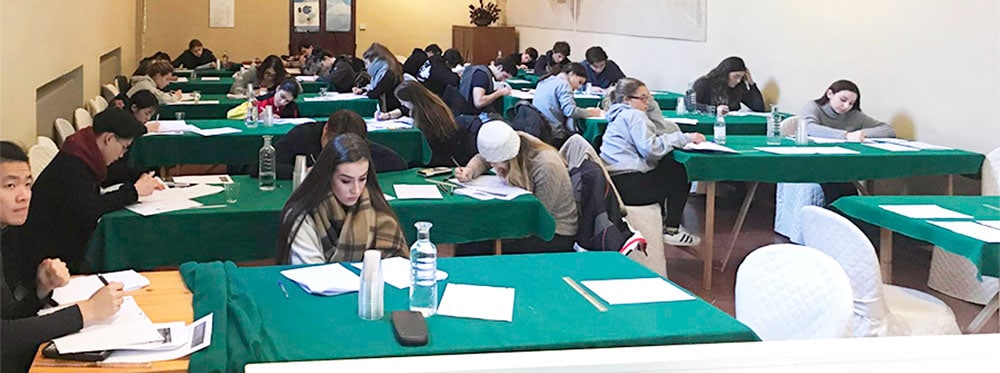The International Baccalaureate Organization (IBO) has determined that the IB Program at TASIS The American School in Switzerland demonstrates “strong programme implementation across all areas” and has conferred 31 commendations upon the School.
IBO’s Analysis
The IBO’s evaluation aims to ensure that the standards and practices of the program are maintained in all schools offering an IB Diploma Program, and the TASIS report was based on the IBO’s analysis of an exhaustive 14-month self-study process led by TASIS UK College Counselor and International Baccalaureate Coordinator Howard Stickley, who sought contributions from the School’s governing body, administrators, teaching and non-teaching staff, students, and parents. The evidence-based self-study, which must be carried out every five years, draws upon a given school’s existing documentation and reflects actual practice at the school over the course of the period under review.
A Strong Programme Implementation
In sharing the TASIS report, IB World Schools Manager Alan Wrafter commended Mr. Stickley and the TASIS community for “the commitment to a thorough self-study process and the thoughtful presentation of your results.”
“The IBO’s glowing report validates all the time and effort that has gone into developing our IB Program in recent years.” – Howard Stickley
Your school shows strong programme implementation across all areas of the programme,” continued Mr. Wrafter. “There were no matters to be addressed, which indicates that all practices are seen to be in place and no additional action is required by the school at this time.”
TASIS Commitment to the IB Program Development
“We are extremely pleased with these results,” said Mr. Stickley, whose distinguished career at TASIS has spanned 37 years. “The IBO’s glowing report validates all the time and effort that has gone into developing our IB Program in recent years. This concerted effort from our Faculty and Administration—combined with increased support from our Board of Directors—has done much to improve teaching and learning at TASIS. Ultimately it’s the students who are benefiting from all this work.”
The Value of IB Diploma
Mr. Stickley has seen a change in the culture at TASIS when it comes to understanding what the IB is and what its value is in preparing students for university. “People have begun to understand that obtaining an IB Diploma presents students with a huge range of possibilities—regardless of whether they manage to achieve top scores on their exams,” he said. “If your goal is to earn 40+ points on your IB Diploma Assessment and land a spot at an ultra-selective university, TASIS can support you in this journey. But you don’t have to be that student to find great success after high school. We have plenty of well-rounded students—athletes, artists, linguists, humanitarians—who don’t score anywhere near the upper echelon on their exams but still get into excellent schools and later report that they felt very prepared once they arrived.”
Commendations from the IBO
The IBO’s report addresses three major sections—Philosophy, Organization, and Curriculum—with the latter two sections further divided into more specific standards.
The Philosophy section
The Philosophy section seeks to determine whether a school’s educational beliefs and values reflect IB philosophy, and TASIS earned commendations for
- developing statements of mission and philosophy that align with those of the IB;
- its deep commitment to promoting international-mindedness across the school community;
- ensuring that commitment to responsible action within and beyond the school community is central to its mission and values;
- developing and implementing a philosophy that promotes open communication based on understanding and respect;
- providing a robust language programme that includes support for the teaching and learning of mother tongues;
- and developing and implementing a variety of processes and strategies in order to promote access to the Diploma Programme.
The Organization section is broken down into two standards: Leadership and Structure (“the school’s leadership and administrative structures ensure the implementation of the IB programme”) and Resources and Support (“the school’s resources and support structures ensure the implementation of the IB programme”).
Leadership and Structure standard
For the Leadership and Structure standard, TASIS was commended for
- developing processes to keep the governing body informed about the ongoing implementation and development of the programme;
- creating structures and defining responsibilities that support all aspects of the implementation of the DP;
- ensuring that the role of the DP coordinator includes pedagogical leadership responsibilities that further support the development of the programme;
- allocating sufficient release time, support and resources to the DP coordinator’s position to ensure that he can effectively carry out the responsibilities of the position;
- making clear the requirements and processes to be followed for admission into the DP;
- for providing a rich selection of taught languages in groups 1 and 2 and provision for studying mother tongue languages;
- developing the context to implement an inclusive programme with policies and practices that effectively support students with special needs;
- developing and implementing an assessment policy that is consistent with IB expectations;
- ensuring there are systems in place for the continuity and ongoing development of the programme;
- and carrying out a thorough and detailed self-evaluation involving all stakeholders.
Resources and Support standard
For the Resources and Support standard, the School was commended for
- making significant efforts and investment to ensure that all DP teachers have received IB recognized training and for developing forward-looking plans to register those in need of training;
- providing opportunities for teachers’ collaborative planning and reflection;
- providing excellent facilities and plans for future developments to support the implementation of the diploma programme;
- and providing a robust system of pastoral guidance and counseling that provides students with detailed support during the programme and in their post-secondary choices.
CURRICULUM
In the final section—Curriculum—TASIS received commendations for successfully reflecting IB philosophy within three different standards: Written Curriculum, Teaching and Learning, and Assessment.
Written Curriculum standard
For the Written Curriculum standard, the School was commended for
- offering a remarkable variety of IB courses, particularly in group 2;
- ensuring that the written curriculum identifies the knowledge, concepts, skills, and attitudes to be developed over time;
- providing opportunities for meaningful student action in response to students’ own needs and the needs of others including an outstanding service learning programme that is integrated into the CAS programme;
- and incorporating relevant experiences for students into the curriculum.
Teaching and Learning standard
For the Teaching and Learning standard, TASIS earned commendations for
- promoting learning experiences to build on what students know and can do
- and for developing a range and variety of strategies for teaching and learning.
Assessment standard
For the Assessment standard, TASIS was commended for
- developing a variety of strategies to assess student learning;
- using a variety of feedback systems to inform and improve student learning;
- ensuring that the recording of student progress supports the IB assessment philosophy and requirements;
- establishing a systematic analysis of assessment data to inform teaching and learning;
- and establishing a thorough process for the supervision of the extended essay.
Thanks to an initiative spearheaded by Mr. Stickley in 2017, all TASIS students in the second year of the IB Diploma Program now spend five days preparing for their exams at a historic monastery in Siena, Italy.
Learn more about this Academic Travel trip.
Continual Improvement
Despite the highly encouraging feedback provided by the IBO, Mr. Stickley believes that TASIS should not rest on its laurels. “Regardless of external inspection of the program, there is always a need to continually evaluate the program and to make improvements that will bring about the best possible outcomes for TASIS IB students,” he said. With an eye toward the next evaluation in 2023, Mr. Stickley would like to see the School focus on the following areas:
- Further develop and implement strategies to promote approaches to teaching and learning—namely, research skills, thinking skills, communication skills, and self-management skills.
- Further emphasize the IB approaches to teaching—namely, instruction that is inquiry-based, develops conceptual understanding, stresses teamwork and collaboration, is differentiated to meet the needs of all learners, is informed by formative and summative assessments, and is developed in local and global contexts
- Review the aims of collaborative planning and reflection and develop a systematic approach to this to allow teachers to explore the connections and relations between subjects in order to reinforce knowledge, understanding, and skills shared by the different disciplines while also developing clear goals, outcomes, and timelines.
Mr. Stickley is confident that TASIS will meet these goals, and he looks forward to seeing the School build upon the strong foundation it has worked so hard to establish.
We have the pieces in place to take an excellent program to even loftier heights. It’s wonderful to hear that the IBO approves of the work we’ve done so far, but we won’t let that stop us from improving further. When I hear TASIS teachers tell me how much they enjoy teaching IB students because they are interested and engaged in their learning, I know we are on the right track. Many thanks should go to our teachers who put so much time, thought, and effort into creating the strong IB program that has been commended by the IBO.







